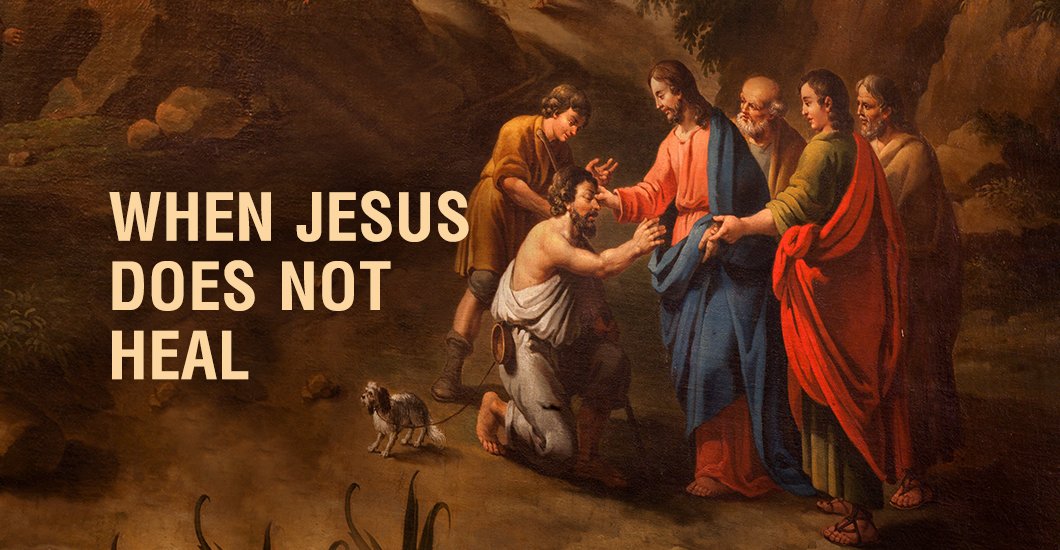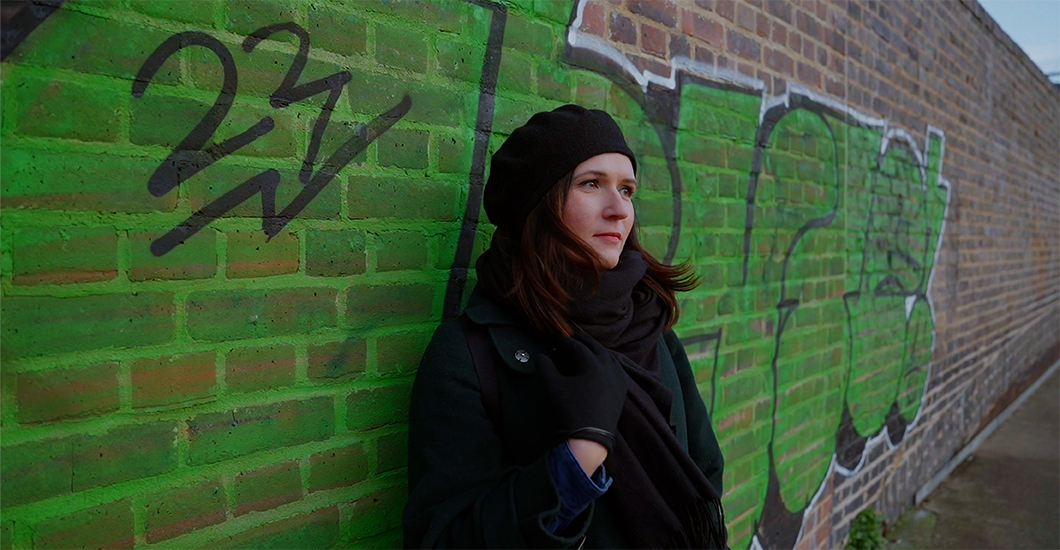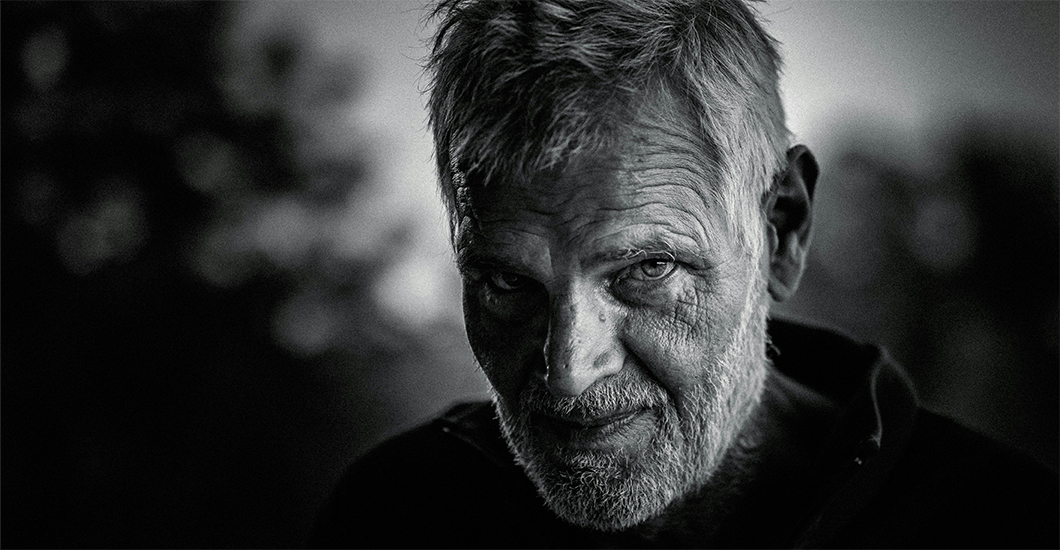Trending Articles
When Jesus Does Not Heal
It seems like a pretty insensitive question. The disciples come across a person who had been blind from birth and ask Jesus, “Rabbi, who sinned, this man or his parents, that he was born blind?” Jesus, of course, sets them straight. This guy is not blind because he sinned. He is blind so that the work of God might be made manifest in him. And then—BOOM—Jesus heals him. Blindness, disease, misfortune—when we encounter these things it is not God sending down his wrath because we have been bad. God does not work that way. Jesus comes to bring life, to breathe healing. In this fallen and imperfect world, God allows us to experience trials and misfortune so that His work might be made manifest in us.
But what about when Jesus does not heal?
Redemptive suffering, you say. It is the correct answer, but it is not an easy one. The whole point of this Christianity thing is that the path to heaven is the cross. We will all come to Calvary. We will all suffer. Yet, because of the Cross—because of Jesus— our suffering can have meaning. Our suffering is a part of our sanctification. It is meant to be offered up to Jesus in order to “complete what is lacking in Christ’s afflictions” (Colossians 1:24).
Knowledge of this fact may not make the chemo easier or the grief hurt less, but at least, because of Jesus, we can do something with our suffering. We can give our hurt to Jesus. Not to make it hurt less, but to allow it to be used for good. Still, it is a bit difficult grappling with the fact that the same Jesus who healed the blind man sometimes allows us to continue in our blindness, our sickness or our pain without manifesting His power through a miraculous healing. Yet I also know that Jesus does not owe me anything. I know that on this side of heaven there will always be suffering. I really do not presume God to grant me miracles to reward my good behavior, and I know my struggles are not Jesus punishing me for bad behavior. Sometimes bad things just happen.
But if I am being totally honest, sometimes my “God doesn’t owe me anything” attitude has less to do with faith than it does with just not trusting God all that much. I spout off fancy, two-dollar phrases like, “Redemptive Suffering,” while on the inside, I am asking with the disciples, “Jesus, who sinned? Why did this have to happen?” After all, God causes it to rain on the righteous and the unrighteous alike? What, then, is even the point in praying? Is it all just essentially “points” and chugging along so that you can end up in the right place when you die? When my knee-jerk reaction to suffering or trials is, “Well, God doesn’t owe me anything,”
I think there is something sort of “off” in my relationship with God. The statement itself is true. God does not owe me anything. He has already given me everything and then some. Yet, God loves me with the love of the Father. When I am crushed in spirit, His response is never simply, “Well, remember, I don’t owe you anything, Mary.” It might not be in His perfect will to take my suffering away in the way that I am praying for, but it is not out of contempt or forgetfulness on God’s part that miracles appear to not come. It is out of love.
God understands my pain. He wants me to draw near to Him in times of trial, not as some kind of test of my love for Him, but because He has a plan and purpose for every moment of my life. God causes all things to work together for my good—my ultimate good, yes, but the seldom spoken truth is that my ultimate good and my immediate good are actually not in opposition to one another. I once heard a priest (I think it was Father John Riccardo) say that the only thing that is going to happen at the end of our lives/at the end of time is that the veil separating us from seeing things as they truly are will be pulled away. It will not be that we suddenly will not remember the events in our lives that caused us great pain, we will just finally see them in their fullness. We will see where God was and what He was doing in our lives’ greatest trials. We will see that God never abandoned us, not even in our weakest moments, He was drawing us closer to Himself.
We will finally see all the ways in which God has made His work manifest in us, even in those times in which it seemed He left us in our blindness. We should never tire of praying for miracles; we can be assured that God is always, always at work within us.
Mary Pearson (@marypearsonblog) is a stay at home wife and mother with a passion for sharing the faith through writing. She has published two books (“Letters From a Young Catholic” and “A Young Catholic's Guide To The Family”) and blogs regularly at marypearsonblog.com.
Related Articles
From being a healthy Uni-student to a paraplegic, I refused to be confined to a wheelchair… In the initial years of University, I slipped a disc. Doctors assured me that being young and active, physiotherapy, and exercises could make me better, but despite all effort, I was in pain every day. I had acute episodes every few months, which kept me in bed for weeks and led to repeated hospital visits. Nevertheless, I held on to hope, until I slipped a second disc. That's when I realized my life had changed. Angry at God! I was born in Poland. My mom teaches theology, so I was brought up in the Catholic faith. Even when I moved to Scotland for University and then to England, I held onto it dearly, maybe not in a do-or-die manner, but it was always there. The initial phase of moving to a new country wasn’t easy. My home had been a furnace, with my parents fighting among themselves most of the time, so I had practically run away to this alien land. Leaving my difficult childhood behind, I wanted to enjoy my youth. Now, this pain was making it difficult for me to hold down jobs and keep myself financially balanced. I was angry at God. Yet, He wasn’t willing to let me go. Trapped at home in acute pain, I resorted to the only available pastime—my mother’s collection of religious books. Slowly, the retreats I attended and the books I read led me to realize that despite my distrust, God really wanted my relationship with Him to be strengthened. But I was also not totally over the anger that He wasn’t healing me yet. Eventually, I came to believe God was angry at me and didn’t want to heal me so I thought maybe I could trick him. I started looking for a holy priest with good ‘statistics’ for healing so that I could get healed when God was busy doing other things. Needless to say, that never happened. A Twist in My Journey One similar day in a prayer group, I was in so much pain. Fearing an acute episode, I was planning to leave when one of the members there asked if there was something I would like them to pray for. I was having some trouble at work, so I said yes. As they were praying, one of the men asked if there was some physical illness that I needed praying over. They were way down on my ‘healing rating’ list, so I didn’t trust that I would receive any relief, but I said ‘Yes’ anyway. They prayed and my pain was gone. I returned home, and it was still gone. I started jumping and twisting and moving around, and I was still okay. But nobody believed me when I told them I was healed. So, I stopped telling people; instead, I went to Medjugorje to thank Our Lady. There, I had an encounter with a man who was doing Reiki and wanted to pray over me. I refused, but before leaving he gave me a goodbye hug which left me worried because I recalled his words that his touch has power. I allowed fear to take over and falsely believed this evil’s touch was stronger than God. I woke up the next morning in excruciating pain, unable to walk. After four months of relief, my pain returned so acutely that I thought I wouldn’t even be able to make it back to the UK. When I returned, I found that my discs were touching the nerves, causing even more drastic pain for months. After six or seven months, the doctors decided that they needed to do the risky procedure on my spine that they had been keeping off for a long time. The surgery damaged a nerve in my leg, and my left leg was paralyzed knee-down. A new journey began there and then, a different one. I Know You Can Do it The very first time I arrived home in a wheelchair, my parents were terrified, but I was filled with joy. I loved all the technological stuff…every single time someone pressed a button on my wheelchair, I was excited like a kid. It was over the Christmas period, when my paralysis started regressing that I realized the extent of damage to my nerves. I was admitted to a hospital in Poland for a while. I didn't know how I was going to live. I was just praying to God that I needed another healing: “I need to find you again because I know you can do it.” So, I found a healing service and was convinced that I would be healed. A Moment You Don’t Wanna Miss It was Saturday and my father had initially not wanted to go. I just told him: “You don't want to miss out when your daughter is healed.” The original schedule had a Mass, followed by the healing service with Adoration. But when we arrived, the priest said they had to change the plan as the team that was meant to lead the healing service was not there. I remember thinking I don’t need any team: “I only need Jesus.” When the Mass started, I did not hear a single word. We were sitting on the side where there was a Divine Mercy picture. I looked at Jesus like I had never seen Him before. It was a stunning image. He looked so beautiful! I never saw that picture anywhere after that. All through Mass, the Holy Spirit was enveloping my soul. I was simply saying in my head ‘Thank you’ even though I didn’t know what I was thankful for. I wasn’t able to ask for healing, and it was frustrating because I needed healing. When adoration started I asked my mom to take me to the front, as close to Jesus as possible. There, seated up front, I felt someone touching, and massaging my back. I was getting so warm and cozy that I felt like I would fall asleep. So, I decided to walk back to the bench, forgetting that I could not ‘walk.’ I just walked back and my mom ran after me with my crutches, praising God, saying: “You are walking, you are walking.” I was healed, by Jesus in the Blessed Sacrament. As soon as I sat down, I heard a voice saying: “Your faith has healed you.” In my mind, I saw the image of the woman touching the cloak of Jesus when He was passing. Her story reminds me of mine. Nothing was helping until I reached this point where I started trusting Jesus. The healing came when I accepted Him and told Him: “You are all I need.” My left leg had lost all its muscles and even that grew back overnight. It was very significant because the doctors were measuring it before, and they found an astounding, unexplainable change. Shouting it Out This time around when I received the healing, I wanted to share it with everyone. I wasn't embarrassed anymore. I wanted everyone to know how amazing God is and how much He loves all of us. I'm no one special and I haven't done anything special to receive this healing. Being healed also doesn't mean that my life became super-comfortable overnight. There are still difficulties, but they are much lighter. I take them to the Eucharistic Adoration and He gives me solutions, or ideas on how I can deal with them, as well as the assurance and trust that He will deal with them.
By: Ania Graglewska
MoreEver experienced what it’s like to be in adoration? Colette’s beautiful account could be life-changing for you. I remember that as a child, I used to think that speaking to Jesus in the Blessed Sacrament was either the most incredible or crazy notion. But that was long before I encountered Him. Years from that initial introduction, I now have a treasure trove of little and big experiences that hold me close to the Eucharistic Heart of Jesus, leading me ever closer, one step at a time…The journey is still on. Once a month, the parish I attended then held an all-night vigil which would start with the celebration of the Eucharist, followed by adoration throughout the night, broken up into hours. Every hour began with some prayer, a Scripture reading, and praise; I recall, during the initial months, the first stirrings of that feeling of being so close to Jesus. Those nights were so focused on the person of Jesus and there, I learnt to speak to the Blessed Sacrament, as if Jesus Himself was standing there. Later on, at a retreat for young adults, I came upon silent Eucharistic Adoration, which felt strange to me at first. There was nobody leading, and no singing. I enjoy singing in Adoration and I've always enjoyed people leading us in prayer. But this idea that I could sit and just be, that was new…At the retreat, there was a very spiritual Jesuit priest who would start adoration with: “Be still and know that I am God.” And that was the invitation. Me and You, Jesus I remember one specific incident that brought a profound realization of this stillness to me. I was at Adoration that day, my designated time had come to an end and the person who was supposed to be taking over from me hadn't arrived. While I was waiting, I had a distinct impression from the Lord: “That person is not here but you are,” so I decided to just breathe. They'd be here any minute I thought, so I focused on the presence of Jesus and was simply breathing. I realized, however, that my mind was leaving the building, getting busy with other cares, whereas my body was still there with Jesus. Everything that was going on in my mind suddenly camped. It was just a sudden moment, almost over before I realized what was happening. A sudden moment of stillness and peace. All the noises outside the chapel felt like music, and I thought: “My goodness, Lord, thank You…Is this what adoration is supposed to do? Lead me into a space where it's just me and You?” This made a deep and lasting impression on me, that the Eucharist is not something, it is Someone. In fact, it's not just someone, it is Jesus Himself. Priceless Gift I think our perception of His presence and gaze plays a big role. The thought of the eye of God fixed on us may feel very scary. But in reality, this is a gaze of compassion. I experience that full-on in adoration. There is no judgment, only compassion. I'm someone who is very quick to judge myself, but in that gaze of compassion from the Eucharist, I'm invited to be less judgmental of myself because God is less judgmental. I suppose I'm growing into this in a lifetime of continuous exposure to the exposed Eucharist. Eucharistic adoration has thus become for me a school of presence. Jesus is 100% present everywhere we go, but it's when I sit in His Eucharistic presence that I'm alerted to my own presence and His. There, His presence meets mine in a very intentional way. This school of presence has been an education in terms of how to approach others too. When I'm on duty in the hospital or the hospice and I'm meeting someone very ill, being a non-anxious presence to them is the only thing I can offer them. I learn this from His presence in Adoration. Jesus in me helps me be present to them with no agenda–simply to ‘be’ with the person, in their space. This has been a great gift to me because it frees me to almost be the Lord's presence with others and to allow the Lord to minister to them through me. There is no limit to the gift of peace that He gives. Grace happens when I stop and let His peace wash over me. I feel that in Eucharistic adoration, when I stop being so busy. I think that in my lifetime of learning so far, that's the invitation: “Stop being so busy and simply be, and let Me do the rest.”
By: Colette Furlong
MoreAdversities mark our lives on earth, but why would God allow that? About two years ago, I fronted up for my yearly blood test and when the results came back, I was told I had ‘Myasthenia Gravis.’ Fancy name! But neither I nor any of my friends or family had ever heard of it. I imagined all the possible terrors that may be ahead for me. Having lived, at the time of diagnosis, a total of 86 years, I had incurred many shocks. Rearing six boys was full of challenges, and these continued as I watched them build their families. I never gave into despair; the grace and power of the Holy Spirit always gave me the strength and trust I needed. I eventually depended on Mr. Google to learn more about ‘Myasthenia Gravis’ and after reading pages of what may happen, I realized I just had to trust my doctor to help me through. He, in turn, put me in the hands of a specialist. I went through a rocky road with newer specialists, changing tablets, more trips to hospital, and eventually having to give up my license. How could I survive? I was the one who drove friends to different events. After much discussion with my doctor and family, I finally realized that it was time to put my name down for acceptance into a nursing home. I chose Loreto Nursing Home in Townsville because I would have opportunities to nurture my faith. I was faced with many opinions and advices—all legitimate, but I prayed for guidance from the Holy Spirit. I was accepted into Loreto Home and made up my mind to accept what was on offer. It was there that I met Felicity. A Near-Death Experience A few years ago, there was a 100-year-flood in Townsville and a reasonably new suburb went under water with most houses inundated. Felicity’s house, like all others in the suburb, was low set, so she had about 4 feet of water throughout the entire house. As the soldiers from the Army Base in Townsville took up the task of a massive cleanup, all the residents had to find alternate accommodation to rent. She stayed at three different rental properties during the next six months, simultaneously helping the soldiers and working towards making her home livable again. One day, she began to feel unwell and her son, Brad, called the doctor on call, who advised on taking her to the hospital if things did not get better. The next morning, Brad found her on the floor with a swollen face and immediately called the ambulance. After many tests, she was diagnosed with ‘Encephalitis,’ ‘Melioidosis’ and ‘Ischemic attack,’ and remained unconscious for weeks. The contaminated flood waters she had waded through six months ago, it turns out, had contributed to an infection of her spinal cord and brain. As she floated in and out of consciousness, Felicity had a near-death experience: “As I was lying unconscious, I felt my soul leaving my body. It floated out and flew up very high to a beautiful spiritual place. I saw two people looking at me. I went towards them. It was my mother and father—they looked so young and were so happy to see me. As they stood aside, I saw something amazing, a stunning face of Light. It was God the Father. I saw people from every race, every nation, walking in pairs, some holding hands…I saw how happy they were to be with God, feeling at home in Heaven. When I woke up, I was so disappointed that I left that beautiful place of peace and love that I believed was Heaven. The priest who was tending to me all throughout my time in hospital said he had never seen anyone react as I did when I woke up.” Adversity into Blessings Felicity says she always had faith, but this experience of imbalance and uncertainty was enough to ask God: “Where are you?” The trauma of the 100-year-flood, the massive clean-up afterwards, the months of setting up her home while living in rental properties, even the nine months in hospital of which she had little memory of could have been the death of her faith. But she tells me with conviction: “My faith is stronger than ever.” She recalls that it was her faith that helped her deal with what she went through: “I believe I survived and came back, to see my beautiful granddaughter go to a Catholic High School and finish Year Twelve. She is going on to University!” Faith believes all things, heals all things, and faith never ends. It is in Felicity that I found the answer to a common question we all may face at some point in life: “Why does God allow bad things to happen?” I’d say that God gives us freewill. Men can initiate bad events, do evil things, but we can also call on God to change the situation, to change the hearts of men. Truth is, in the fullness of grace, He can bring good even out of adversity. Just as He led me to the nursing home to meet Felicity and hear her beautiful story, and just as Felicity found strength in faith as she spent endless months in the hospital, God can change your adversities into goodness too.
By: Ellen Lund
MoreWhen your path is swarming with difficulties, and you’re feeling clueless, what would you do? The summer of 2015 was unforgettable. I was at the lowest point of my life—alone, depressed, and struggling with all my strength to escape a terrible situation. I was mentally and emotionally drained, and felt that my world was going to end. But strangely, miracles unfold when we least expect them. Through a string of unusual incidents, it almost seemed as if God was whispering in my ear that He has got my back. On that particular day, I had gone to bed desperate and broken. Unable to sleep, I was once again pondering the sad state of my life as I clutched my rosary, attempting to pray. In a strange kind of vision or dream, a radiant light began emanating from the rosary on my chest, filling the room with an ethereal golden glow. As it slowly started to spread, I noticed dark, faceless, shadowy figures at the periphery of the glow. They had been closing in on me with unimaginable speed, but the golden light grew brighter and drove them farther away whenever they tried to come close to me. I felt frozen, unable to react to the strangeness of the vision. After a few seconds, the vision suddenly ended, plunging the room into pitch blackness again. Deeply disturbed and afraid to sleep, I turned on the TV. A priest was holding up a Saint Benedict medal* and explaining how it offered a divine protection. As he discussed the symbols and words inscribed on the medal, I glanced down at my rosary—a gift from my grandfather—and saw that the Cross on my rosary had the same medal embedded into it. This triggered an epiphany. Tears started rolling down my cheeks as I realized that God was with me even when I thought my life was crumbling into ruin. A fog of doubt lifted from my mind, and I found solace in the knowledge that I was no longer alone. I had never realized the meaning of the Benedictine medal before, so this newfound belief brought me great comfort, strengthening my faith and hope in God. With immeasurable love and compassion, God was ever-present, ready to rescue me whenever I slipped. It was a comforting thought that embraced my being, filling me with hope and strength. Revamping My Soul This shift in perspective propelled me on a journey of self-discovery and growth. I stopped viewing spirituality as something distant and remote from my everyday life. Instead, I sought to nurture a personal connection with God through prayer, reflection, and acts of kindness, realizing that His presence is not confined to grand gestures but could be felt in the simplest moments of everyday life. A complete transformation did not happen overnight, but I began to notice subtle changes within myself. I’ve grown more patient, learned to let go of stress and worry, and embraced a newfound faith that things will unfold in accordance with God’s will if I place my trust in Him. Moreover, my perception of prayer has shifted, evolving into a meaningful conversation stemming from an understanding that, although His benevolent presence may not be visible, God listens and watches over us. Just as a potter sculpts clay into exquisite art, God can take the most mundane parts of our lives and shape them into the most beautiful forms imaginable. Belief and hope in Him will bring better things into our lives than we could ever accomplish on our own, and enable us to remain strong despite all the challenges that come our way. *Saint Benedict Medals are believed to bring divine protection and blessings to those who wear them. Some people bury them in the foundations of new buildings, while others attach them to rosaries or hang them on their home walls. However, the most common practice is to wear the Saint Benedict medal on the scapular or embed it in a Cross.
By: Annu Plachei
MoreI approached Him for success in my studies, but He didn’t stop there… During my high school years, I experienced a remarkable journey of faith and academic growth. As a devout Catholic, I firmly believed that God's presence was constantly with me, especially when it came to my studies. I remember one particular semester, I was facing a daunting load of exams and assignments. The subjects seemed to pile up, and I felt overwhelmed by the sheer amount of information I needed to grasp. Doubt started to creep into my mind, making me question my abilities. In those moments of uncertainty, I turned to prayer as my source of solace and guidance. Each evening, I would retreat to my room, light a candle, and kneel before my crucifix. I poured my heart out to God, expressing my fears and doubts while asking for strength, wisdom, and clarity in my studies. An Invisible Guide As the weeks went by, I noticed something extraordinary happening. Whenever I encountered a challenging topic or struggled with a difficult concept, I would find unexpected clarity. It was as if a light was being shone upon my path, illuminating the way forward. I would stumble upon helpful resources or passages in books that perfectly explain complex ideas, or receive unexpected support from classmates and teachers. I started to realize that these were not mere coincidences but rather, the signs of God's presence and help in my academic journey. It was as if He was guiding me, gently nudging me towards the right resources, the right people, and the right mindset. As I continued to trust in God's guidance, my confidence grew, and my grades began to improve. I noticed a marked difference in my ability to absorb information and comprehend complex concepts. I was no longer studying alone; I had an unseen companion by my side, guiding me through every challenge and encouraging me to persevere. But it wasn't just about the grades. Through this experience, I learned valuable lessons about faith and trust. I learned that God's help was not limited to spiritual matters but extended to every aspect of our lives, including our studies. I learned that when we turn to God with sincere hearts, He not only hears our prayers but also provides the support we need. Keeping Connected This journey taught me the importance of maintaining a strong connection with God, seeking His guidance, and trusting in His plan. It reminds me that true success is not measured solely by academic achievements but also by the growth of character, resilience, and faith. Looking back, I am grateful for the challenges I faced during that semester, as they deepened my relationship with God and strengthened my conviction in His unfailing assistance. Today, as I continue my academic pursuits, I carry the lessons learned during that time, knowing that God's divine guidance will always be there to lead me on the path to knowledge and fulfillment. In a world where academic pressures can often consume us, it is essential to remember that we are not alone in our journey. As Catholics, we have the privilege of seeking God's guidance and finding solace in His presence all the time. Through this personal story, I hope to inspire others to trust in God's unwavering support, not only in their studies but in every aspect of their lives. May we all find comfort in knowing that God is our ultimate teacher, guiding us toward wisdom, understanding, and unshakeable faith.
By: Delon Rojes
MoreWhat would you do when a stranger knocks at your door? What if the stranger turns out to be a difficult person? He says his name with emphasis, in Spanish, with a certain pride and dignity, so you’ll remember who he is—Jose Luis Sandoval Castro. He ended up on our doorstep at Saint Edward Catholic Church in Stockton, California, on a Sunday evening when we were celebrating our patron feast day. Somebody had dropped him off in our relatively poor, working-class neighborhood. The music and the crowd of people apparently drew him like a magnet to our parish grounds. Unveiling the Truth He was a man of mysterious origins—we did not know how he arrived at the church, let alone who and where his family was. What we did know was that he was 76 years old, bespectacled, dressed in a light-colored, well-worn vest, and was pulling his luggage by hand. He carried a document from the Immigration and Naturalization Service granting him permission to enter the country from Mexico. He had been robbed of his personal documents and carried no other identification with him. We set about exploring and discovering who Jose Luis was, his roots, his relatives, and whether they had any contact with him. He hailed from the town of Los Mochis in the state of Sinaloa, Mexico. Anger, vitriol, and venom spewed from his mouth. He claimed that his relatives had ripped him off and robbed him of his pension in the United States, where he had worked for years, as he went back and forth to Mexico. The relatives we contacted claimed they tried to help him on various occasions, yet he called them thieves. Who were we to believe? All we knew was that we had a wandering, regular drifter from Mexico in our hands, and we could not abandon him nor put the old, infirm man out on the street. Coldly, callously, one relative said: “Let him fend for himself on the streets.” He was a man of bluster, bravado, and gruffness, yet he flashed signs of vulnerability again and again. His eyes would water, and he would almost sob as he told how people had wronged and betrayed him. It seemed like he was all alone, deserted by others. The truth was—it was not easy to help him. He was ornery, stubborn, and proud. The oatmeal was either too chewy or not smooth enough, the coffee was too bitter and not sweet enough. He found fault with everything. He was a man with a gigantic chip on his shoulders, angry and disappointed with life. “People are bad and mean, they’ll hurt you,” he lamented. To that, I retorted that there were ‘Buena gente’ (good people) too. He was in the arena of the world where good and evil intersect, where people of goodness and kindness mixed together, like the wheat and chaff of the Gospel. More than a Welcome No matter his defects, no matter his attitude or his past, we knew we should welcome him and help him as one of the least of the brothers and sisters of Jesus. “When you welcomed the stranger, you welcomed me.” We were ministering to Jesus himself, opening the doors of hospitality to him. Lalo Lopez, one of our parishioners who took him in for a night, introduced him to his family, and took him to his son’s baseball game, observed: “God is testing us to see how good and obedient we are, as His children.” For several days, we put him up in the rectory. He was weak, spitting out phlegm every morning. It was obvious he could no longer roam and drift freely as he was accustomed to doing in his younger days. He had high blood pressure, over 200. On one visit to Stockton, he said he was hit behind the neck near a downtown church. A son in Culiacan, Mexico, said he “engendered me” and that he never really knew him as his dad, for he was never around, always traveling, heading for El Norte. The story of his life began to unfold. He had worked in the fields, harvesting cherries, many years ago. He had also sold ice cream in front of a local church a few years ago. He was, to quote the Bob Dylan classic song, “like one with no direction home, like a complete unknown, like a rolling stone.” As Jesus left the 99 sheep behind to rescue one stray sheep, we turned our attention to this one man, apparently shunned by his own. We welcomed him, housed him, fed him, and befriended him. We came to know his roots and his history, the dignity and sacredness of him as a person, and not just as another throwaway on the streets of the city. His plight was publicized on Facebook by a woman who transmits video messages of missing persons to Mexico. People asked: “How can we help?” One man said: “I’ll pay for his ticket home.” Jose Luis, an illiterate man, rough and unrefined, came to our parish fiesta, and by the grace of God, we tried, in some small way, to emulate the example of Saint Mother Teresa, who welcomed the poor, the lame, the sick, and the outcasts of the world into her circle of love, the banquet of life. In the words of Saint John Paul II, solidarity with others is not a feeling of vague compassion or shallow distress at the misfortunes of others. It is a reminder that we commit to the good of all because we are all responsible for one another.
By: Father Alvaro Delgado
More‘Set a timer for five minutes and thank God for this person.’ I bet you are wondering what on earth I’m talking about. Sometimes, we forget to talk to God about unsettled situations regarding the people God places in our lives. Many times, I forget this. One day, by God’s grace, I chose to do something about the lack of peace in my heart. Several years ago, I was having a difficult time with someone in my life. I’ll skip the details. My problem was that it really bothered me. Have you ever been in a situation like this? I made a decision to talk to a priest about it and went to Confession. After he heard my confession, the priest gave me absolution and my penance. Guess what my penance was? If you said ‘set a timer,’ you are absolutely right! He said: “I want you to spend five minutes thanking God for this person.” Five Minutes Five Minutes? Yikes! Determined, I said to myself, I can do this. I left the Church and went to my car. I set my watch for five minutes, and immediately, I was stuck. Wow, this is really difficult! Slowly, I found little ways to thank God for this person. I checked my watch…ugh, only one minute passed. I continued to pray with all my heart. I want to do this! Again, I began thanking God. As the minutes slowly passed by, it became easier and easier. My five minutes still wasn’t up. Continuing with a renewed sense of determination, I found myself thanking God even for the small difficulties. Inside, my heart was leaping! Praying for this person was really working to change my heart. Why was I so consumed by these difficulties? This is really a good person. Remembering I often remember that day. When I face difficulties with someone, I attempt to apply what I learned from that particular penance. Do you remember the promise made when we recite the Act of Contrition? Those final words before we are absolved from our sins? “… I firmly resolve, with the help of Thy grace, to confess my sins, do penance, and amend my life. Amen.” Now, when I find myself ruminating over some difficulty I’m experiencing with someone, I stop, set a timer, and spend five minutes thanking God for them. It always astounds me how God can turn my heart around in such a short time. Jesus looked at them and said: “For human beings, this is impossible, but for God, all things are possible.” (Matthew 19:26) Thank you, Jesus, for the priest who sometimes gives us a difficult but much-needed penance. Thank you, Jesus, for your healing touch. Thank you, Jesus, for each person You put on our paths. Thank you, Jesus, for loving us so much! Five minutes was and is so little time to have received such a great reward: peace of heart. “Jesus said to them again, ‘Peace be with you!’” (John 20:21)
By: Carol Osburn
MoreI was three when my life turned upside down. Nothing was ever the same again, until I met Him! At three years of age, I had a heavy fever followed by a sudden seizure, after which I started showing signs of facial palsy. By the time I was five, my face became visibly asymmetric. Life ceased to be smooth. As my parents kept reaching out to new hospitals, the pain and mental damage I went through became too much to bear—the repeated questions, the weird looks, the effects and aftereffects of new medications every once in a while… Crawling into a Cocoon I was comfortable alone because, ironically, groups made me feel lonely. I was so scared that the kids next door might cry out loud if I smiled at them. I remember the sweets my dad brought home every night to help me drink the unpleasant medicine, which was overloaded with bitterness. The weekly walks with my mother along the hospital corridors for the physiotherapy sessions were never a weekend trip—every time the vibrations from the stimulator hit my face, tears would start to roll down. There were some beautiful souls who soothed my fears and pain, like my parents, who never gave up on me. They took me to every hospital they possibly could, and we tried a variety of treatments. Later, I would also see them devastated when neurosurgery was suggested. For the first time in my life, I felt that I was being lived out somewhere else. I had to do something. So, in the first semester of college, unable to bear it any longer, I decided to discontinue the medicines. Discovering Beauty After I stopped the meds, I had an adrenaline rush to create something on my own. I welcomed a new life, but I was totally clueless about how I should live it. I started writing more, dreaming more, painting more, and searching for colors in all the grey areas of life. Those were the days I started actively participating in the Jesus Youth Movement (an international Catholic movement approved by the Holy See); I started to slowly learn how to open myself to God’s love and feel loved again… The realization of the importance of the Catholic lifestyle helped me understand my purpose. I started to believe again that I am so much more than everything that has happened to me. Now, when I look back at those moments marked by the closed doors, I can clearly see that within each rejection, the ever-compassionate presence of Jesus accompanied me, enveloping me with His boundless love and understanding. I recognize who I’ve become and the wounds I’ve healed from. Reason to Hold on Our Lord says: “Since you are precious and honored in my sight, and because I love you, I will give people in exchange for you, nations in exchange for your life. Do not be afraid, for I am with you.” (Isaiah 43:4-5) Finding Him in my insecurities was never an easy task. While having plenty of reasons to move farther, it was all about finding that one reason to stay. And it gave me strength and confidence to live through my vulnerabilities. The journey of finding my worth, dignity, and joy in Christ was simply wonderful. We often complain about not finding grace even after the struggles we go through. I think it’s all about seeing through the struggles. Expressing honesty in the slightest adjustment in life without any sort of wrath brings light to your life. It was quite a journey. And while He is still writing my story, I’m learning each day to embrace more, reach out without inhibitions, and make room for little joys in life. My prayers no longer hold the constant need for things I desire. Instead, I’m asking Him to strengthen me to say ‘Amen’ to the changes that keep happening along the way. I’m praying that He heals and transforms me from all the negative influences within and around me. I’m asking Him to revive the parts of me that were lost. I’m thanking Him for everything I’ve been through, all the blessings I receive every minute of the day, and for the person I’ve become. And I’m trying my best to love Him with all my heart and soul.
By: Emilin Mathew
MoreMy husband was given a death sentence; I did not want to live on without him, but his firm convictions surprised me. Five years ago, my world came crashing down when my husband was diagnosed with a terminal disease. The life and the future I envisioned were forever changed in an instant. It was terrifying and confusing; the most hopeless and helpless I’ve ever felt. It was as though I had been plunged into an abyss of constant fear and despair. I had only my faith to cling onto as I faced the darkest days I’ve ever known. Days of caring for my dying husband and days of preparing to face a life completely different than what I had planned. Chris and I had been together since we were teenagers. We were best friends and nearly inseparable. We had been married for over twenty years and were happily raising our four children in what seemed like an idyllic life. Now he was given a death sentence, and I didn’t know how I could live without him. In truth, part of me didn’t want to. One day, in a moment of brokenness, I confided in him that I thought I might die of a broken heart if I had to live without him. His reaction was not as desperate. He sternly but empathetically told me that I had to keep living until God called me home; that I couldn’t wish or waste my life away because his was coming to an end. He confidently assured me that he would be watching over me and our children from the other side of the veil. The Other Side of Grief Chris had an unshakeable faith in God’s love and mercy. Convinced that we wouldn’t be separated forever, he would often recite the phrase: “It’s just for a little while.” This was our constant reminder that no heartache lasts forever—and these words gave me boundless hope. Hope that God will guide us through this, and hope that I will be reunited with Chris in the next life. During these dark days, we clung to Our Lady in the Rosary—a devotion we were already familiar with. The Sorrowful Mysteries were recited more often than not because contemplating the suffering and death of Our Lord brought us closer to Him in our own suffering. The Divine Mercy Chaplet was a new devotion that we added to our daily routine. Like the Rosary, this was a humbling reminder of what Jesus willingly endured for our salvation, and somehow it made the cross we had been given seem less heavy. We began to more clearly see the beauty in suffering and sacrifice. I would mentally repeat the small prayer: “Oh, Most Sacred Heart of Jesus, I place all my trust in You” every hour of the day. It would bring a wave of calm over me whenever I felt a rush of uncertainty or fear. During this time, our prayer life deepened tremendously and gave us hope that Our Lord would be merciful to Chris and our family as we endured this painful journey. Today, it gives me hope that Chris is at peace, watching over and interceding for us from the other side—just as he promised. In these uncertain days of my new life, it’s hope that keeps me going and gives me strength. It has given me immeasurable gratitude for God’s endless love and tender mercy. Hope is a tremendous gift; an inextinguishable interior glow to focus on when we feel broken. Hope calms, hope strengthens, and hope heals. Hope takes courage to hold onto. As Saint John Paul II said: “I plead with you! Never, ever give up on hope. Never doubt, never tire and never become discouraged. Be not afraid.”
By: Mary Therese Emmons
MoreWhatever the situation you are going through, God will make a way where there seems to be no way… Today, my son Aaric brought home his dictation book. He got a red star with a ‘good’ remark. This might not be a big deal for a kindergartener, but for us, it is a celebrated achievement. The first week of school, I got a call from his class teacher. We dreaded this call, my husband and I. As I tried hard to explain his communication skills (or lack thereof) to his teacher, I remember confessing that while I cared for his big sister with special needs, I had fallen into this pattern of doing things without being asked. As she could not utter a single word, I had to guess her needs. The same mode was turned on for Aaric, too, in his early days. Even before he asked for water, I would give it to him. We had a bond that didn’t need words, a language of love, or so I thought. How miserably wrong I was! Not much later, when his little brother Abram turned three months old, I had to take those heavy steps again to see the counselor at school. This time, it was about Aaric’s poor writing skills. His dear class teacher panicked when she saw him drop his pencil on the table and stubbornly fold his hands as if to say: “I won’t write.” We dreaded this, too. His little sister Aksha was an expert at scribbling at the age of two, but Aaric wouldn’t even hold the pencil. He just didn’t fancy it. The First Step After receiving instructions from the counselor, I visited the principal, who insisted that we undergo a thorough assessment if his communication continues to be weak. I couldn’t even think of that back then. For us, he was a miracle baby. After what we went through with our firstborn and three miscarriages, Aaric had defied all odds. He was born full-term, unlike what the doctors had predicted. His vitals were normal at birth. “He’s a big baby!” exclaimed the doctor on bringing him out through a C-section. We watched him grow step by step with almost bated breath, praying nothing would go wrong. Aaric soon reached all his milestones. However, when he was just one year old, my father mentioned that he may need speech therapy. I brushed it off as being too early to diagnose. The truth was, I didn’t have the strength to face another problem. We were already worn out with all that our firstborn was going through. Anna was born preterm at 27 weeks. After many grueling days in the NICU, she was diagnosed with severe brain damage at three months and had epileptic seizures. After all the treatments and medications, our now 9-year-old daughter still battles with cerebral palsy and intellectual disability. She is unable to sit up, walk, or talk. Countless Blessings There’s a limit to holding off the inevitable, so six months ago, we reluctantly took Aaric to get an initial assessment. The ADHD diagnosis was hard. We struggled to accept it, but we still put him through speech therapy. At this point, he was only stuttering a few words. A few days back, I mustered the courage to go to the hospital with Aaric and get a full, thorough assessment. Mild autism was what they said. As we were going through the process of assessment, several questions were asked. To my surprise, my response to most of these questions was: “He wasn’t able to, but now he can.” Praise God! By the power of the Holy Spirit living in him, everything is possible. I believe that praying and blessing him every day before going to school has made a difference. The change was radical when he began to memorize Bible verses. And the beauty is that he recites those verses just when I need them. Indeed, the Word of God is living and active. I believe the transformation is ongoing. Whenever I feel low, God surprises me by making him say a new word. Amid the tantrums he puts up, and when everything seems to crumble down, my little girl, three-year-old Aksha, simply comes up and gives me a hug and a kiss. She really knows how to comfort her mama. I believe that God will surely intervene and heal our eldest daughter, Anna, too, for nothing is impossible for Him. Change is already visible—the number of times she goes into epileptic seizures has gone down tremendously. In our walk of life, things may not be going as expected, but God never leaves nor forsakes us. Just like oxygen that is essential yet invisible, God is ever present and provides the life we need so badly. Let us cling to Him and not doubt whilst in the darkness. May our testimony reveal the truth of how beautiful, wonderful, and loving our God is and how He transforms us to say: “I was …, but now I am ….”
By: Reshma Thomas
MoreLatest Articles
Christmas comes with the reminder of getting gifts for everyone, but is it really the gift that matters? Browsing in a local Christian bookstore many years ago with my boyfriend at the time, our eyes landed on a particular picture at exactly the same moment. It was a large, colorful depiction of Jesus, entitled The Laughing Christ; with His head tossed back slightly, somewhat disheveled, dark brown hair framed crinkled eyes, twinkling with delight! It was perfectly enchanting! We found ourselves staring at the slightly crooked smile beneath the subject of the portrait's engaging gaze. Oh, so inviting! So accepting! So attractive! Glancing up from this likeness toward each other, we shared the excitement the other felt at discovering this unique presentation of the person we had each come to know and trust in the last few years. We were both raised with statues and pictures of Jesus in our respective homes, but He was always portrayed as serious, somehow detached from life as we knew it. While we believed the person represented in these images had truly lived on this earth and even prayed to Him when we needed something, our faith individually had recently become something very real...alive, even. This artist’s impression reflected who we both discovered the Lord to be in our lives—someone with whom we could share life, someone who loved us in ways we had never known before, someone who revealed Himself to us when we prayed. As a result, our understanding of God was transformed from merely an intellectual assent of His existence to a new experience of a living, communicative, and wonderful friend; our very best friend. Even as we left the store a little while later, our animated conversation about this portrayal continued. It captured each of our hearts, yet neither of us had made a move to purchase it. As soon as I got home, I knew I had to go back and buy this picture. A few days later, I did just that, then carefully wrapped it, and waited excitedly for Christmas to arrive. Gift of Honor The days passed till finally, it was Christmas Eve. With carols playing in the background, we sat on the floor near the small straggly artificial tree given to me by my mother. Handing my gift to my beloved, I waited expectantly to hear his appreciation as he spied the new wristwatch I had placed on the paw of the little stuffed dog who would cleverly deliver the timepiece. A mumbled “thanks” was all the response I got. No worries, that wasn't the gift that I knew would be perfect. But first, I was to open his gift to me. Reaching to accept it, I felt a bit puzzled. It was large, rectangular, and flat. As I began to open it, pulling the wrapping paper away from the present, I suddenly saw...my picture?! The same one I secretively purchased for him? Yes, that was it! The Laughing Christ. The picture I loved so much but instead of being thrilled, I felt disappointed. This was supposed to be his present. The one I knew was exactly what he wanted. I tried to hide my disappointment, leaning over to give him a kiss while expressing my appreciation. Then pulling out the present I had carefully wrapped and hidden behind the tree, I gave it to the object of my love. He opened it, ripping the paper quickly, revealing the contents of the package. His face looked happy...didn't it? Or was it a bit crestfallen like I had felt mine would have looked if I hadn't worked so hard to hide my disappointment from him when it had been my turn to open a gift? Oh, we both said the all right words, of course, yet somehow we sensed the gift we received from each other was not nearly as meaningful to us as we had hoped. It was the giving of that present that we both looked forward to with such anticipation. It reflected the Christ we’d both experienced and our desire was to share who we each had come to know. That was where the joy was found, not in having our own desires met, but in fulfilling the desires of the other. In time, my relationship with that young man ended. While it was painful, the joyful image of Jesus continued to hold a place of honor on my wall. Now, it is so much more than just a depiction, and so much more than just a man. It stays as a reminder of the One who would never leave me, the One with whom I would always be in a relationship, the One who would dry my tears many times through the years. But more than that, the One who is always such a source of delight in my life. After all, He was my life. Those crinkling eyes met mine. Then, that engaging smile invited me to pull the corners of my own mouth upward. And just like that, I was laughing alongside my Best Friend.
By: Karen Eberts
MoreI didn’t know their language or their emotional pain...How could I connect with them? Thursday, February 22, 2024, is a day I will never forget. At 05:15 AM, along with several of my colleagues in Catholic Social Services, I awaited the arrival of 333 refugees from Ethiopia, Eritrea, Somalia, and Uganda. Egyptian Airlines was entrusted with flying them from Entebbe, Uganda, to Cairo, Egypt, and finally to their Canadian entry point, Edmonton. Suddenly, the doors at the other end opened and the passengers started walking toward us. Not knowing how to speak their languages, I felt extremely vulnerable. How would I, as one so privileged to be born in Canada, one who has never spent a moment in a refugee camp, be able to greet these exhausted, hopeful, apprehensive sisters and brothers in a way that would say: “Welcome to your new home”...? I asked one of my colleagues who speaks five languages: “What can I say?” “Just say, Salam, that will be enough”. Suddenly, the doors at the other end opened and the passengers started walking toward us. Not knowing how to speak their languages, I felt extremely vulnerable. How would I, as one so privileged to be born in Canada, one who has never spent a moment in a refugee camp, be able to greet these exhausted, hopeful, apprehensive sisters and brothers in a way that would say: “Welcome to your new home”...? I asked one of my colleagues who speaks five languages: “What can I say?” “Just say, Salam, that will be enough”. Extending a Hand After everyone was lined up in the Customs Hall, our team went downstairs and began passing out bottles of water, granola bars, and oranges. I noticed one older Muslim woman, perhaps 50-55 years of age, bent over her trolley, trying to push it. I went and greeted her with ‘Salam’ and smiled. With gestures, I tried to ask if I could help push her trolley. She shook her head: “No.” Six hours later, outside the Customs Hall, people were sitting in different cordoned-off areas; only 85 would be remaining in Edmonton and were waiting for family or friends to meet them and take them home. Some would be boarding a bus to be taken to other cities or towns, and still others would be overnighting in a hotel and would fly to their final destination the next day. For those who were being bussed to other cities in Alberta, a four to seven-hour trip awaited them. The elderly Muslim woman I had seen in the Customs Hall, I discovered, was to fly to Calgary the next day. I looked at her and smiled, and her whole face was radiant. As I approached her, she said in faltering English: “You love me.” I took her hands in mine, looked into her eyes, and said: “Yes, I love you and God/Allah loves you.” The young woman next to her, whom I discovered was her daughter, said to me: “Thank you. Now my Mom is happy.” With tears in my eyes, a heart full of joy, and very tired feet, I left the Edmonton International Airport, profoundly grateful for one of the most beautiful experiences of my life. I may never encounter her again, but I know with absolute certainty that our God who is the embodiment of tender, compassionate love was made visible and tangible to me through my beautiful Muslim sister. In 2023, there were 36.4 million refugees seeking a new homeland and 110 million people displaced because of war, drought, climate change, and more. Day in and day out, we hear comments like: “Build walls,” “Close the borders,” and “They are stealing our jobs.” I hope that my story will, in some small way, help people understand the scene of Matthew 25 better. The righteous asked Jesus: “When Lord, God, did we do all these for you?” and He replied: “Whenever you did it to one of these little ones of Mine, you did it to Me.”
By: Sr. Mary Clare Stack
MoreCrosses came in one after the other, but the Lord’s mercy never failed this family! I gave birth to my firstborn ten years ago, and we were overjoyed! I still remember the day; we were so glad to know that it was a baby girl. I couldn’t thank the Lord enough for His blessings upon my family. Like every mother, I dreamt of buying cute frocks, clips, and booties for my little doll. We named her ‘Athalie,’ meaning ‘God is exalted.’ We were praising God for His beautiful gift. Little did we know that our joy would soon be turned into a deep heartache or that our prayer of gratitude would soon be replaced with petitions for His mercy for our precious baby. At four months old, she became severely sick. With multiple seizure attacks, she would cry for hours and couldn’t sleep or feed well. After multiple tests, she was diagnosed with brain damage; she was also suffering from a rare kind of severe childhood epilepsy named ‘West Syndrome,’ which affects one in 4,000 children. Repeated Blows The diagnosis was too shocking and heartbreaking for us. I didn’t know how I could face the storm. I wanted my heart to be numb to the emotional pain I was going through. Many questions ran through my mind. This was just the beginning of a long and painful journey that I was never prepared to take. My baby girl continued to suffer from seizures for almost two and a half years. Doctors tried multiple medicines, painful daily injections, and numerous blood tests. She would cry for hours and all I could do was to ask for God to bestow His mercy on my child. I felt helpless for not being able to comfort her in any way. Life felt like a deep and dark pit of agony and despair. Her seizures eventually subsided, but she suffered global developmental delays. As her treatment was progressing, another shocking news rattled our family. Our son Asher, who was having speech delay and behavioral issues, was diagnosed with high-functioning autism at the age of three. We were on the verge of losing hope; life felt too overwhelming for us as new parents. No one could understand or feel the pain we were going through. We felt lonely and miserable. However, this period of loneliness and the painful days of motherhood brought me closer to God; His Word provided solace to my weary soul. His promises, which I was now reading with a deeper meaning and fuller understanding, encouraged me. Spirit-led Penmanship It was during this difficult season of my life that God enabled me to write faith-filled and encouraging blogs for people going through challenges and suffering similar to mine. My articles, birthed from my daily devotions, shared the challenges of special parenthood and included my life experiences and insights. God used my words to heal many aching souls. I am truly grateful to Him for turning my life into a useful vessel for His love. I would say that the despair of our daughter’s sickness solidified our family’s faith in God. As my husband and I ventured onto the unknown path of this unique parenthood journey, all that we had to cling to were the promises of God and the faith in our hearts that God will never leave nor forsake us. What once appeared like heaps of ashes began to turn into beauty of strength as God extended His grace, peace, and joy to us during the most heart-wrenching and dark season of our life. In the loneliest moments, spending time at His feet brought us renewed hope and the courage to move ahead. Answered Prayers After years of treatment and unending prayers, Athalie’s seizures are now controlled, but she continues to have a severe form of cerebral palsy. She can’t talk, walk, see, or sit by herself and is completely dependent on me. Having recently moved from India to Canada, our family is currently receiving the best treatment. A substantial improvement in her health is making our lives more colorful. Asher is out of the spectrum, and he has caught up completely on his speech. After many schools had initially rejected him because of his inattentiveness, I home-schooled him till grade five. Though he shows a few traits of ADHD, by God’s grace, he is now enrolled in grade six in a private Christian school. He is a book lover who shows a unique interest in the solar system. He loves learning about different countries, their flags, and maps. Though life is still filled with challenges, the love of God is what makes us parent our children with love, patience, and kindness. As we continue to embrace the hope we have in Jesus and travel through this unique path of special-needs-parenting, I believe that there are times when we have answers to our prayers right away, and our faith works and produces results. In those times, God’s strength and power are revealed in what He does for us—the sure answer to our prayers. On other occasions, His strength continues to shine through us, enabling us to endure our pain with courage, letting us experience His loving mercies in our difficulties, showing us His power in our weaknesses, teaching us to develop the ability and wisdom to take the right steps ahead, empowering us to tell stories of His strength, and encouraging us to witness His light and hope amidst our challenges.
By: Elizabeth Livingston
MoreJohn Taylor was in his mid-50s when he came home one day from a game of golf and shared with his wife a strange pain he had begun to experience in his hands. He was soon diagnosed with Hodgkin’s Lymphoma, a rare form of cancer that would slowly reduce his athletic body to mere skin and bones in a span of just 20 years. As the illness grew in strength, part of his tongue was removed; he couldn’t speak or eat, so he was fed directly through a tube. Though I had trouble understanding what he was saying, I enjoyed his company very much. He had a great sense of humor, and Anne was a beautiful cook, so I ended up spending many evenings with the family. In 2011, at the height of his illness, John, who belonged to the Church of Wales, expressed his desire to become a Catholic like his wife Anne! On Christmas Eve, a Mass was held for him in their living room. At the time of Holy Communion, I poured a little jug of the Precious Blood through his tube directly into his stomach so that he could celebrate his First Holy Communion. It was one of the most extraordinary First Holy Communions I've ever seen and one of the most beautiful Christmas Eve of my life. The memory of that day and that blessed couple still reminds me of what I am doing as a priest—bringing the Incarnation and the Precious Blood of Christ to the world. During his last days, John bled profusely every morning, so Anne had to repeatedly change his bedclothes. It was extraordinary—while John’s state reminded me of the crucified Christ, Anne was configured to the Virgin Mary who stood by and took care of Him in His passion. We buried Anne last year, more than a decade after John’s passing. Jesus said the Saints would shine like stars in the Kingdom of God; now, with two more, the night sky is brighter.
By: Father Mark Byrne
More

















